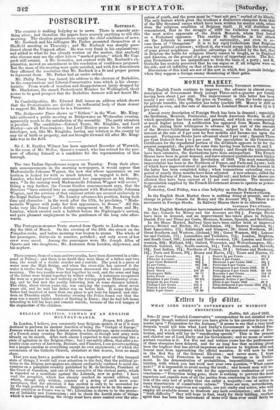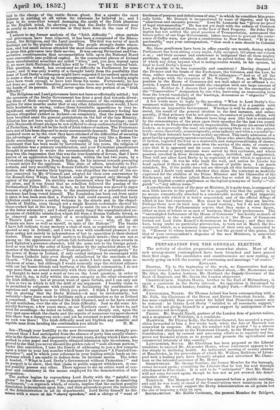Trtttro in tht thitur.
WHAT LORD DERBY'S GOVERNMENT IS WITHOUT PROTECTION.
Dublin, 6th Apra 1852. Sin—If your "Puzzled Conservative" correspondent be not satisfied with the ample though indirect answer you have given to his question in your re- marks upon "Preparation for the Autumn," it seems to me that a very brief formula would tell him what Lord Derby's Government is without Pro- tection. It is a Government which has buried the murdered corpse of Pro- tection, and which will lay its " wandhering sperrit." This is the present and chided use of Lord Derby and his Government; and no mean or unim- portant vocation is it. For five sad and tedious years has the performance of these obsequies been delayed, and for as long has that mocking ghost been the bugbear that has served impostors and knaves to frighten able and honest men from approaching the official mansion. It will now be laid in the Red Sea of the General Election ; and never more, I hope and believe, will Protection be named on the hustings or in Parlia- ment. In the demonstration of probabilities, impossibilities, and cer- tainties, with which you last week met your own question, "What comes next?" it is impossible to avoid seeing the truth ; and honest men will be- lieve M as well as ardently wish for the approximate realization of your conclusion—" Protection being gone, there is nothing to prevent the most
sagacious and capable men of all the parties from combining in the construction of the only sort of policy that can enlist a majority—one of action m
many departments of conservative reform." There are men, nevertheless, who being neither sagacious nor capable, are yet crafty and active, who will employ all available means to frustrate any such combination ; and in the Irish difficulty" they will hope to find, ready for their bidding, another spirit that has been the instrument of more evil than ever could fairly be laid to the charge of the rustic Saxon ghost. But a spectre the most hideous is nothing at all unless its existence be believed in; and I hope to do somewhat toward damaging the credit of the Irish phantom
the English mind, by showing you that the Derby Government may do nearly as much for its exorcism as they have done in the case of Pro- tection.
I adhere to my former analysis of the "Irish difficulty " : since certain reJ grievances have been removed, it has been a compound of the Educa- tional, the Religious, and the Land questions. The first was never of much hustings use to the popular candidates. The people strongly desire educa- tion, and but small success attended the most zealous exertions of the priests to press this grievance into their service. Rwas among Protestant and Con- servative constituencies that accommodation bills upon the National Board were convertible into political capital. In the commercial phrase of Ireland those unsubstantial securities are called "kites," and, you may depend upon it, no more Anti-National-Board kites will be " done " in any electoral bank. This question, indeed, has occasioned no difficulty in Parliament for some years ; and it was only worthy of a thought lately from the possibility that some of Lord Derby's colleagues might have supposed it incumbent upon them to make a show of taking up their acceptances, and that'll's Lordship might have been weak enough to have lent them his name. Fortunately, he has not done so ; and the Education grievance has been most wisely strangled by the hands of its parents. It will never again form any portion of an "Irish difficulty." The Religious and:Land grievances luive not been so effectually settled ; but the accession of the Derby Government has done a good deal towards divest- ing them of their unreal terrors, and a continuance of the existing state of parties for nine months under that or any other Administration would, I have little hesitation in saying, reduce those formidable apparitions to very in- significant earthly proportions. The old Protestant Ascendancy feeling has become altogether extinct in Ireland—so completely, that the name has not been breathed amid the general gratulations on the fail of the late Ministry. Allusion has not been made to the subject, in address or on hustings; and if Anti-Maynooth-Hrant pledges be not suffered to sleep undisturbed in the tomb of Protection, it will not be the faultof Irish takers or makers. The Protestants have not of late been disposed to make unreasonable demands. They will not be rendered more so by the view they have attained of the difficulties of securing the advantages of simple equality. But something very like a Roman Ca- tholic ascendancy was growing up, very rapidly, in Ireland. In every ap- pointment that has been made by Government of late years the religion of the candidate was a primary consideration, and your Protestlint placehunters thought it prudent to secure the recommendation of a Romish priest. So deep was the impression that this was the true fountain of favour, that I have known of an application having been made, within the last two years, by a Protestant clergyman to a banish Bishop, for his interest towards procuring a vacant mitre for the applicant. This state of affairs, intolerable to Pro- testants, and very mortifying to Roman Catholic laymen who had any quali- fication for office besides their baptism, was altogether the result of the no- tion conceived by Mr. O'Connell and adopted for their own convenience by the Russell-Grey 'Whigs, that Ireland could be governed only through the agency of the priests. Its stability was threatened when the Wiseman quar- rel arose, and it was found that no rebellion followed the passing of the Ecclesiastical Titles Bill; that, in fact, no lay Irishman was moved to anger because a slight check was given to the presumption of a priesthood whose insolence had long vexed himself. The foundation has been cut from under it since it has been seen that a Patrick's ball could succeed, and that Lady Eglinton could receive a cordial welcome in the streets and in the chapel- schools of Dublin, even though not a single Romish ecclesiastic showed his three-cocked hat at the levee. I happened to assist (to use a French phrase) at the latter solemnity ; and I shall not easily forget the unsophisticated ex- pressions of childlike satisfaction which fell from a Roman Catholic friend, as he observed each new arrival of a co-religionist in the antechamber. "There's Lord —, and Mr. —, and Sir —: why, all the old Romans are here as well as myself, in spite of the Bishops !" The blanks I have left indicate to my memory a class of men as respectable and as re- spected as any in Ireland; and I own it was with unaffected pleasure I saw them acting not merely in independence of but in opposition to their clerical leaders. These may seem light matters to English minds—they are not so among us: the appearance of certain full-bottomed wigs and dress-swords in Lord Eglinton's presence-chamber, told the same tale to the foreign priest- hood as was told to the usher of Louis Quinze by the unbuckled shoes of the member of the States deputation—" Tout est penlu !" " Tout serait perdu" for the power of Rome in Ireland, if only cordial intimacy be encouraged with the Roman Catholic laity even though unhallowed by the sanctions of the Church. "Pax demi, helium foris," is a motto I have seen upon souse es- cutcheon of arms; but although I would earnestly urge the strictest alliance with our lay- house-friends and brethren of the Romish communion, I do not urge more than an armed neutrality with their alien spiritual guides.
I thought to have said a word or two on the Land question, in order to show that it, too, is fully within the same category as the other elements of the Irish difficulty : but at present want of space forbids, and I can only ask a line or two in which to tell the drift of my argument. I humbly claim to be permitted to cooperate with yourself in facilitating the combination of sagacious and capable men to which you point. I think I have gone some way in proving that the Derby Ministry—it may be involuntarily, but certainly—have done much to facilitate such a combination so far as Ireland is concerned. They have sounded the Irish Channel, and so far have carried all sail scatheless, over the site of the Irish difficulty. Just so did some Ad- miralty Surveyor, a few years since, on our Northern coast: he hove to, and tried for soundings—he sailed on boldly, and looked sharply out, upon the very spot upon which the charts and the reports of numerous voyagers showed Inna there was a dangerous rock—and yet he returned to port unharmed ; for no rock was there ! The Irish difficulty need not frighten any sensible and capable man from heading the combination you allude to. H. M.



























 Previous page
Previous page